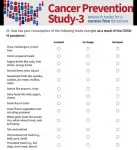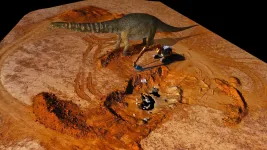When the economy goes down, so does the quality of our diets
Study examining dietary trends during the Great Recession offers lessons for the COVID-19 era
2021-06-07
(Press-News.org) Rockville, Maryland (June 7, 2021) -- What did Americans eat during the Great Recession? A new study suggests dietary quality plummeted along with the economy.
According to the study, adults overall ate more refined grains and solid fats and children increased their intake of added sugar during the recession. The impacts of the downturn were especially pronounced in food-insecure households, where individuals significantly reduced their intake of protein and dark green vegetables while increasing total sugars.
"Overall, we found that the Great Recession had a negative impact on dietary behaviors in both adults and children," said Jacqueline Vernarelli, PhD, director of research education and associate professor of public health at Sacred Heart University, the study's lead author. "This adds to a robust body of evidence that economic downturn impacts household income, employment status and subsequent household food security levels."
Emma Turchick, a graduate student in Vernarelli's lab at Sacred Heart University, will present the research at NUTRITION 2021 LIVE ONLINE.
Although the study did not examine impacts from COVID-19, researchers say the findings are likely relevant to today's economic environment.
"The COVID-19 pandemic has resulted in unprecedented increases in food insecurity, and a dramatic increased need for emergency food resources and other types of food assistance," said Vernarelli. "By identifying key intake patterns during the previous recession, we can identify areas that may need intervention now and during the [pandemic] recovery years."
The study used data from a nationally representative sample of over 60,000 U.S. adults and children. Researchers analyzed dietary intakes and household food security before (2005-2006), during (2007-2010) and after (2011-2014) the Great Recession.
Household food security is defined as all members of the household having access to enough food for an active, healthy life at all times. Food insecure households have limited or uncertain availability of nutritionally adequate and safe foods, or limited or uncertain ability to acquire acceptable foods in socially acceptable ways. People with food insecurity are at greater risk for nutrient insufficiency and chronic diseases.
The study findings suggest that nutritional quality deteriorates as families substitute cheaper foods in place of healthier options. While overall food quantity may not be lower in many food-insecure households, the quality, desirability and variety of the diet is often reduced, according to researchers. The study found that children in households with low food security consumed higher levels of solid fat and added sugars during the recession, taking in 200 calories more per day on average than in the periods before and after the recession.
"Using historical data to understand and anticipate potential nutrient needs and areas of concern may better help public health nutritionists serve communities faced with food insecurity, as well as help inform decisions related to food assistance policy," said Vernarelli. For example, she noted that the findings can help inform efforts to improve access to nutritious foods through programs such as SNAP, WIC and the National School Lunch Program.
Turchick will present this research in an on-demand poster session during NUTRITION 2021 LIVE ONLINE from noon on Monday, June 7 through 5:30 p.m. on Friday, June 10 (abstract; presentation details). The poster includes additional data analyzed after the original abstract was submitted.
Please note that abstracts presented at NUTRITION 2021 LIVE ONLINE were evaluated and selected by a committee of experts but have not generally undergone the same peer review process required for publication in a scientific journal. As such, the findings presented should be considered preliminary until a peer-reviewed publication is available.
INFORMATION:
About NUTRITION 2021 LIVE ONLINE
NUTRITION 2021 LIVE ONLINE, held June 7-10, 2021 is a dynamic virtual event showcasing new research findings and timely discussions on food and nutrition. Scientific symposia explore hot topics including clinical and translational nutrition, food science and systems, global and public health, population science and cellular and physiological nutrition and metabolism. https://meeting.nutrition.org #NutritionLiveOnline
About the American Society for Nutrition (ASN)
ASN is the preeminent professional organization for nutrition research scientists and clinicians around the world. Founded in 1928, the society brings together the top nutrition researchers, medical practitioners, policy makers and industry leaders to advance our knowledge and application of nutrition. ASN publishes four peer-reviewed journals and provides education and professional development opportunities to advance nutrition research, practice and education. http://www.nutrition.org
Find more news briefs and tipsheets at: https://www.eurekalert.org/meetings/nutrition/2021/newsroom. Watch on-demand sessions, view posters and more by registering for a END
ELSE PRESS RELEASES FROM THIS DATE:
2021-06-07
Rockville, Maryland (June 7, 2021) -- There has been a long-standing debate as to whether a low-fat or a plant-centered diet is better at lowering the risk of cardiovascular disease. A new study that followed more than 4,700 people over 30 years, found that a plant-centered diet was associated with a lower long-term risk for cardiovascular disease. However, both diets were linked with lower LDL, or bad cholesterol, levels.
"Since 1980, dietary guidelines in the United States and in Europe have recommended eating low amounts of saturated fat because of the high rates of heart disease in these regions," said research team leader David Jacobs, PhD, from the University of Minnesota. "This is not necessarily wrong, but our study shows that plant-centered ...
2021-06-07
Rockville, Maryland (June 7, 2021) -- As COVID-19 spread throughout the world, our daily routines and behaviors changed drastically. A new study of more than 2,000 people in the U.S. found that the pandemic has also affected how we eat. The authors found a decrease in the consumption of many food groups, particularly healthy foods such as vegetables and whole grains, compared to before the pandemic.
"When the pandemic began, we saw panic buying, problems in the food supply chain, increases in food prices and rising unemployment rates," said Caroline Um, PhD, a postdoctoral fellow at ...
2021-06-07
Concerned youths worldwide today delivered a policy vision for policy-makers to address the declining state of the world's ocean.
A carbon neutral economy, preserving biodiversity, achieving sustainable seafood production, and reforming ocean governance are the four fundamental pillars supporting policy recommendations debuted in the Global Blue New Deal, an ocean policy framework built around crowd-sourced youth priorities.
"Healthy oceans are essential to human survival and well-being, and environmental health must be a global priority as we recover from the pandemic and build a sustainable blue economy," says Mark Haver, Chair of the Sustainable Ocean Alliance's Youth Policy Advisory Council.
He and 14 fellow Young Ocean Leaders ...
2021-06-07
During his time at EPFL under the Erasmus program, Romain van Wassenhove came up with an idea for a connector that could be used to make modular structures out of sustainable bamboo rather than wood, plastic or metal. "I wanted to focus my Master's on a topic that had meaning to me and that would lead to a concrete application," he says. "Working with bamboo was something I already had in mind while I was studying in Brussels." His connectors can be 3D-printed in biosourced plastic and are customizable to the type of material used for the structure.
Van Wassenhove got the idea for his connector during a class at EPFL on composite materials and developed the concept further through his Master's project, co-directed at EPFL by Senior Scientist Anastasios Vassilopoulos and by associate ...
2021-06-07
Scientists from the University of Graz (Austria), Skoltech and their colleagues from the US and Germany have developed a new neural network that can reliably detect coronal holes from space-based observations. This application paves the way for more reliable space weather predictions and provides valuable information for the study of the solar activity cycle. The paper was published in the journal Astronomy & Astrophysics.
Much like our life on Earth depends on the light of the Sun, our electronic "life" depends on the activity of our closest star and its interactions with Earth's magnetic field. For the ...
2021-06-07
Carbon loss in Canadian peatland is projected to increase by 103 per cent under a high emission scenario, according to new research led by scientists from the University of Waterloo.
The results of the study, which was published today in Nature's Communications Earth & Environment journal, reinforces the urgent need for a comprehensive understanding of peatlands as evolving sources of atmospheric CO2 in a warming world.
Peatlands, which are a type of wetland, are some of the most valuable ecosystems globally. In addition to their role in preserving biodiversity and minimizing ...
2021-06-07
Older Chinese immigrants who adjust to their new cultural environment by learning the language, following the country's media and socializing with local residents can reduce acculturation gap with their adult children and protect their cognitive function, according to a Rutgers study.
The study, published in the journal Aging and Mental Health, is one of the first to explore the relationship between intergenerational families, acculturation and cognitive function among older Chinese Americans.
Researchers looked 2,900 Chinese Americans over age 60 who had at least one child and who participated in the PINE Study, an epidemiological study of older Chinese Americans. They analyzed three areas of acculturation - language, media use and ethnic social relations - and how they corresponded ...
2021-06-07
What's as long a basketball court, taller than a b-double and has just stomped into the record books as Australia's largest dinosaur? It's time to meet Australotitan cooperensis - a new species of giant sauropod dinosaur from Eromanga, southwest Queensland.
Australotitan, "the southern titan", has been scientifically described and named by Queensland Museum and Eromanga Natural History Museum palaeontologists.
It is estimated to have reached a height of 5-6.5 metres at the hip and 25- 30 metres in length and sits within the top 10-15 largest dinosaurs world-wide, representing Australia's entry into the largest species to have ever walked the Earth.
The fossilised skeleton was originally nicknamed 'Cooper' after Cooper Creek, ...
2021-06-07
An international team of scientists led from the Centre for Astrobiology (CAB, CSIC-INTA), with participation from the Instituto de Astrofísica de Canarias (IAC), has used the Gran Telescopio Canarias (GTC) to study a representative sample of galaxies, both disc and spheroidal, in a deep sky zone in the constellation of the Great Bear to characterize the properties of the stellar populations of galactic bulges. The researchers have been able to determine the mode of formation and development of these galactic structures. The results of this study were recently published in The Astrophysical Journal.
The researchers focused their study on massive disc and spheroidal galaxies, using imaging data from ...
2021-06-07
Bad sleep causes severe health issues and affects our ability to concentrate, memorize, and cope with challenging situations. Individuals with neurodevelopmental disorders such as autism and intellectual disability, frequently suffer from sleep problems. However, little is known about their underlying mechanisms. In Science Advances, a Dutch-American research team, coordinated by Radboudumc, now describes how these problems can arise. Mimicking two genetic causes of autism in fruit flies, they uncovered that flies show the same sleep problems as the patients, and that the disturbed ...
LAST 30 PRESS RELEASES:
[Press-News.org] When the economy goes down, so does the quality of our diets
Study examining dietary trends during the Great Recession offers lessons for the COVID-19 era






